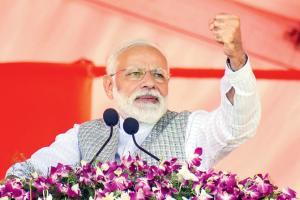While most of us may brush off news of the referendum we cannot ignore the truth of a certain divisive brand of politics

While the referendum will just be a fringe event, of no consequence to the larger politics of India, clearly it is influenced by Narendra Modi's idea of India. Pic/PTI
 A friend from Canada mentioned a referendum in 2020. What referendum? I asked. For Khalistan, he said. I was surprised: who announced this, and when?
A friend from Canada mentioned a referendum in 2020. What referendum? I asked. For Khalistan, he said. I was surprised: who announced this, and when?
ADVERTISEMENT
The Khalistan movement for a separate state for Sikhs was one of the topics dominating news in north India when I began journalism in the 1980s. By the early '90s my friends in intelligence spoke of a sinister Pakistani plot supporting two insurgencies, in Kashmir and for Khalistan, with the coded name of 'K2' that made me LOL because it sounded so pulp-fiction. Former Prime Minister PV Narasimha Rao pushed for the 1992 assembly election in Punjab that, for the most part, laid the Khalistani ghost to rest. My attention as a reporter shifted full-time to Kashmir, which made Sikh extremism seem modest in comparison.
Around three years ago, a friend in the narcotics control bureau mentioned a visiting official from a large European nation, who warned that the Khalistan movement was rearing its head again. He speculated that a "lost generation" in Punjab – lost partly to drugs, partly to shrinking job opportunities and reluctance to work on the family land – was susceptible to separatism because there was nothing to do and it provided them with purpose. The drug menace and allegations that state ministers were profitting off of Punjab's drug addiction epidemic peaked during the 2017 assembly election, and then seemed to die down again.
Despite this, the talk of a referendum came out of the blue. My Canadian friend said it was still more of a diaspora thing. The Sikh diaspora is widespread. In the '80s, journalists used to joke that Khalistan already existed – in Southall, a suburb of London. In the early 2000s I even heard of a Sikh opening a tandoori eatery in Vladivostok, Russia, a place that I had always imagined as the edge of the world.
A former colleague migrated in the late 1990s to Canada, whose Sikh population has such an established profile that they are even represented as ministers in the federal government. He does a lot of work commissioned by members of the diaspora – including coffee table books that are basically vanity projects for Sikh entrepreneurs that have "arrived". Canadian Sikhs are about as populous as in the US, which has since 9/11 seen several instances of attacks on Sikhs mistaken for Osama supporters, ostensibly due to the turban.
Some in the American diaspora have pushed for this referendum, perhaps inspired by Britain's three years ago to leave the European Union. To many in India the kind of profound nostalgia that emigrants suffer is not apparent – they miss their homeland so much that they idealise it and weave fantastic dreams about it. That's why so many Hindus – like my own relatives living in the USA – become fanatically right-wing and are perhaps PM Narendra Modi's greatest supporters, according him a rockstar welcome whenever he visits. For many Sikhs who live abroad, the sacrilege of the army's Operation Bluestar on the Golden Temple in Amritsar in 1984 and the nightmare of the November riots following Indira Gandhi's assassination that same year are both deeply etched in their collective memory. Though Sikhs in India have since moved on, these memories remain the main historical marker for their co-religionists abroad.
I asked a Punjabi friend, formerly in government, about the referendum. He laughed; he, too, had only months ago heard about it. He had visited Chandigarh over the winter and said that a couple of posters had surreptitiously been put up, and there was an incident or two of slogan-painting on walls, but he did not think it was a serious movement here in India. Indeed, he was sanguine that the so-called referendum would not succeed.
The larger point, however, was that a lot of Sikhs in India had been made nervous by Modi's scorched-earth brand of divisive politics. Since 2014, there have been many incidents of attacks by Modi's supporters on Muslims and dalits for a variety of excuses. The latest were the attacks on Kashmiri students and traders following the February 14 bombing of a paramilitary convoy in Pulwama, Kashmir; and the attack by two Hindutvawadis on a dry fruits seller in Lucknow last week, that went viral. It is telling that Sikhs came to the rescue of Kashmiris under attack and offered refuge to those who were nervous of Hindu mobs. In their mind, if these minorities come under attack, can our turn be far behind? Will 1984 be repeated?
And while the referendum will just be a fringe event, of no consequence to the larger politics of the Punjab or India, clearly it is influenced by Modi's idea of India, in which "others" have only a second-class citizenship. It is worth mulling as we head into the parliamentary election.
Aditya Sinha's latest book, India Unmade: How the Modi Government Broke the Economy, with Yashwant Sinha, is out now. He tweets @autumnshade Send your feedback to mailbag@mid-day.com
Catch up on all the latest Mumbai news, crime news, current affairs, and also a complete guide on Mumbai from food to things to do and events across the city here. Also download the new mid-day Android and iOS apps to get latest updates
 Subscribe today by clicking the link and stay updated with the latest news!" Click here!
Subscribe today by clicking the link and stay updated with the latest news!" Click here!






